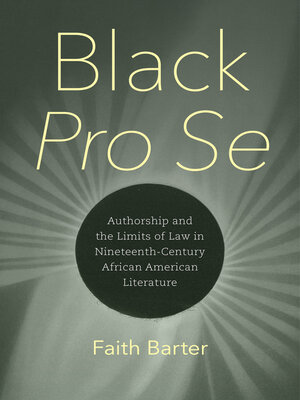Black Pro Se
ebook ∣ Authorship and the Limits of Law in Nineteenth-Century African American Literature
By Faith Barter

Sign up to save your library
With an OverDrive account, you can save your favorite libraries for at-a-glance information about availability. Find out more about OverDrive accounts.
Find this title in Libby, the library reading app by OverDrive.



Search for a digital library with this title
Title found at these libraries:
| Library Name | Distance |
|---|---|
| Loading... |
Black thinkers in the antebellum United States grappled with what it meant to inhabit a place, a history, and a violent legal regime. In newspapers and pamphlets, political speeches, and fiction, Black writers persistently imagined alternative and liberatory legal futures. In reading these writers as architects of legal possibility, Faith Barter mobilizes the coincidental intimacy of prose and the legal term pro se, which refers to litigants who represent themselves in court. The book studies multiple literary genres—short stories, novels, freedom narratives, speeches, confessions, periodicals, and pamphlets—alongside legal historical treatises, trial transcripts, judicial opinions, and statutes.
Barter juxtaposes nineteenth-century law and literature to show how Black writers counterintuitively used legal forms to reimagine their own relationships to time and place. Organized around four legal forms—appeal, confession, jurisdiction, and precedent—this book demonstrates how Black writers creatively used them to challenge the logics of their oppression. Reading Black writers not merely as witnesses or victims but as visionaries for what the legal system could be, this book excavates the importance of legal thinking in the African American literary tradition.
Barter juxtaposes nineteenth-century law and literature to show how Black writers counterintuitively used legal forms to reimagine their own relationships to time and place. Organized around four legal forms—appeal, confession, jurisdiction, and precedent—this book demonstrates how Black writers creatively used them to challenge the logics of their oppression. Reading Black writers not merely as witnesses or victims but as visionaries for what the legal system could be, this book excavates the importance of legal thinking in the African American literary tradition.







